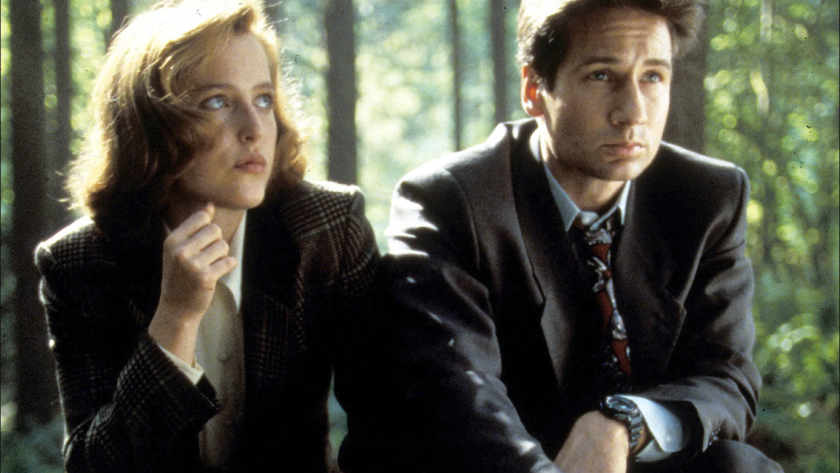Sub-Editor Mayra Nassef takes a look at the cultural impact of genre-bending The X-Files following its 30th anniversary screening at the Prince Charles Cinema, asking if we should ‘Fight the Future’ or embrace it?
30 years on, The X-Files’ cultural legacy and impact on TV feels quite significant. While the show itself was influenced by other earlier sci-fi shows such as The Twilight Zone and Twin Peaks, it pioneered a particular subgenre of supernatural procedural drama. The show’s monster-of-the-week formula was perfected by the show as well as used for inspiration by other showrunners for many years to come. The show was instrumental in the creation of shows like Breaking Bad directly, and was a clear inspiration for modern TV shows such as Supernatural. Its impact on fan culture is also evident; the word “shipper” originally started to proliferate online on X-Files forums as an abbreviation of the word “relationshipper”. While remnants of The X-Files can be seen in media and pop culture today, the popularity of the show in the 90’s was probably best reflected through the release of the first out of two films: The X-Files: Fight the Future (1998). As a fan, I felt ecstatic that it was included as part of the NeoNoirvember programme at Prince Charles Cinema, and felt it was time to do a bit of a retrospective after rewatching it there!
It is quite an interesting pick for Neonoirvember because it works quite well when it comes to the theme. Taking place between Seasons 5 and 6 of The X-Files show, the film focuses on a plot thread that extends throughout the entire show: alien invasion. The film follows main characters Mulder (David Duchovny) and Scully (Gillian Anderson) after the closure of The X-Files unit at the end of Season 5 and their reassignment to a different FBI unit. During the film, they discover that there seems to be a potential global conspiracy regarding this alien invasion that is being hidden by the government. It is for this reason that the film definitely fits the bill when it comes to neo-noirs. Mulder and Scully seem to operate outside the law during the film (also in the show), and while Mulder is not necessarily an antihero, he is an incredibly flawed character who acts impulsively out of a sheer obsession for finding the truth that is “out there” – as well as to protect his partner Dana Scully. Scully also operates outside of the law to find the truth, usually being the voice of reason for Mulder (and the audience). Cinematically though, I must say that the film does not wow in ways that neo-noirs usually do.
There are a couple of issues with this film that have everything and also nothing to do with the show itself. The film falls into the trap of TV-into-film adaptation syndrome in which the same formula and structure of an episode is adapted into a film. Surprisingly, The Lizzie McGuire Movie (2003) – which I watched last week also at Prince Charles Cinema – does not fall into this trap. The X-Files formula works in the TV show, and perhaps that is why it was used here. There’s the cold open, the investigations, autopsy, informant, and obviously the climax which is almost certainly a chase when it comes to this specific alien plotline. However, this formula completely throws off the pacing and tone of the film. The cold open is twice as long as it would be, scenes linger on for just way too long, and the informant’s presence feels a tad bit too convenient due to the scope of the film.
The film was created to appeal to a wider audience that did not watch the show, but ends up relying on a lot of context from the show either way. The story itself is probably not too difficult to understand (but potentially endlessly confusing for long-time X-Files viewers). Despite this, significant characters such as Cigarette-Smoking-Man play a significant role in the film without any context whatsoever, and the relationship between Mulder and Scully feels like it developed off the big screen rather than organically in the film. It’s honestly impossible to remedy that second criticism so that is definitely a nit-pick, but what ends up happening is dialogue exposition dump. Dialogue exposition dump where Mulder explains how the FBI views him as an outsider in a dense dialogue section that almost feels a little bit too exposition-y. It’s really a limitation of the medium. The wide appeal was also definitely encountered when it came to the budget. There are endless shots of helicopters, explosions, and practically anything that would cost quite a bit. It’s a spectacle, and it really hurts the tone of the film, making it feel more like a blockbuster at times that’s obsessed with showcasing its own technical prowess.
While I do sound overly critical, I actually quite enjoy the film and think it’s the most cohesive of the alien plotlines that are strewn around the show. It has a dark tone that is quite nice, and I think that the budget does actually help in some regards to make it feel like a horror film rather than just campy and small-scale. I also do think the story works, despite the long pace. The film perhaps does best what The X-Files does best; it represents the political and cultural climate permeating at the time.
Nothing reflects this uneasiness with the fear of looking inwards more than a shot in the film that pans up from a children’s playground to what seems to be an alien-testing facility. It is a largely paranoid shot, and it is very X-Files. The show – as well as the film – uniquely came out in a time in American culture when the general response to the post Cold-War era and the Vietnam-war era was to question what was happening domestically. Alongside questioning domestic affairs, there is also that creeping fear of globalisation and the “other”, so obviously represented by the aliens who have come to colonise Earth. It almost feels like a prelude to Y2K.
Love it or hate it, The X-Files film perhaps best represents the show’s success at the time, and its trailblazer impact 30 years later only reaffirms its status as one of the most iconic modern Western TV shows. While its rampant paranoia seems to be from a bygone era, its ability to reflect the atmosphere in the US at the time is quite incredible. If there’s something to take away from the film/series today, is that the “truth is out there”, but maybe not on random conspiracy Reddit forums.




